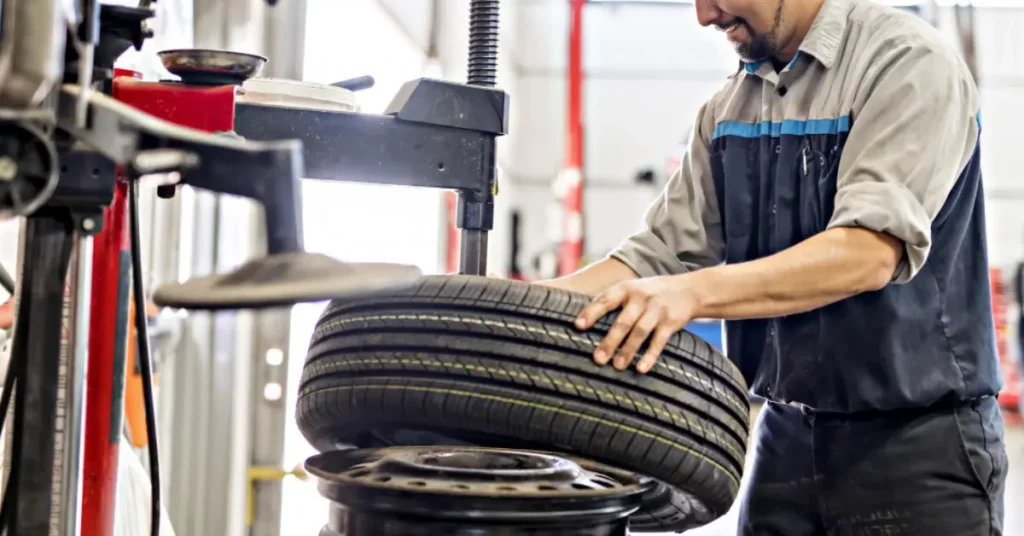8 min read
Key Takeaways:
- Legal Musts: Business and zoning permits are non-negotiable for legality.
- Eco Compliance: Hazardous waste and stormwater permits are environmental essentials.
- Location-Specific: Local laws dictate permit types and fees.
- Plan Ahead: Permit approval can take up to a year; apply early.
If you’re dreaming of opening your own tire shop, your wheels are already turning with excitement!
When it comes to the permits and requirements to open a tire shop, securing the right permits and licenses is crucial. This is similar to the permits required for a mechanic shop.
We’ll explore the core permits, regulations, and requirements to have in place so you can legally and successfully launch your tire business!
And while you’re diving into the automotive world, don’t forget to check out these safe winter driving tips and explore essential car headlight bulb maintenance practices.
Must-Have Permits and Licenses
The tire industry offers a steady demand as car owners regularly need new tires and maintenance. But before you get to the fun stuff like choosing tire brands and shop layouts, you need to handle some key logistics.
Ensuring business compliance starts with obtaining the right permits and licenses. This is the cornerstone of legally operating your tire shop.
When starting a tire shop, these are the typical permits and licenses required:
Business License
A business license (sometimes called an occupational license) is mandatory to operate any commercial venture. This license grants you official approval to run your tire shop within the jurisdiction of a certain city, county, or state.
Requirements vary by location, but generally, you’ll need to submit an application, pay a fee, and provide personal identification, business ownership/lease paperwork, insurance documentation, and any required operating permits or certifications.
Zoning Permit
Zoning rules dictate what types of businesses are allowed in different areas. A zoning permit confirms your proposed tire shop address and property comply with the designated zoning classification and restrictions.
Understanding zoning laws for commercial use is essential. Make sure your tire shop location complies to avoid legal complications.
For example, an automotive business may not be allowed in a strictly residential neighborhood. But a commercial or industrial zone is likely fine. Check with your local zoning department to understand the regulations in your chosen area.
You’ll submit a zoning permit application with details like services offered, hours, parking, and other operational impacts. There may be a public hearing to address any concerns from the community.
Environmental Permits
Because tires and car maintenance involve hazardous materials, tire shops must obtain permits related to the proper handling, storage, and disposal of waste. This includes used motor oil, worn tires, and other automotive fluids.
Common environmental permits include:
- Hazardous waste generator permit – For storing and disposing of used tires and other hazardous waste. The rules vary based on the volume of waste.
- SPCC plan – Details spill prevention and countermeasures to quickly respond to any release of oil, gas, or chemicals into the environment.
- Stormwater permit – Required if your shop has outdoor storage or vehicle maintenance areas that could contribute to pollution runoff.
An SPCC (Spill Prevention, Control, and Countermeasure) plan is a set of rules that companies follow to prevent oil spills that could harm waterways. It’s a regulatory requirement under the U.S. Environmental Protection Agency (EPA) and tells you what to do if a spill happens. The plan includes safety measures and lists who to call for clean-up.
Consult local environmental agencies to understand specific regulations and permits needed based on the scale of your shop and the services offered. Adhering to automotive business regulations is crucial, especially when it comes to environmental concerns. Make sure you’re up-to-date with waste disposal laws.
Fire and Safety Permits
Occupational safety in the automotive business is paramount. Ensure you meet Occupational Safety and Health Administration (OSHA) standards and have the necessary fire safety measures in place.
To protect the safety of customers and employees, tire shops must meet fire codes and occupational hazard requirements. Common permits and inspections cover:
- Fire safety – Extinguishers, exit signs, emergency plans, fire suppression systems.
- OSHA – Employee training on safety gear and proper materials handling.
- First aid – Ability to provide basic medical care for injuries.
- Hazardous materials – Proper protective equipment, storage, and protocols.
Schedule inspections with your local fire marshal and health department to obtain needed permits and approvals.
Sales Tax Permits
Charging sales tax on goods and services requires special registration and permitting through your state’s revenue or taxation department. You’ll be provided with info on collecting, reporting, and remitting sales tax each year.
Building Permits
If your tire shop location requires any new construction or renovations, you’ll need building permits for those projects – plumbing, electrical, HVAC, signs, etc. Building permits ensure work is up to code.
Highway Access Permits
If your shop has a driveway entrance/exit accessing a state or federal highway, you may need a highway access permit. This regulates traffic flow and safety.
Digging Into the Details
Now that you have a handle on the main permit categories, let’s walk through some examples of how to apply for and obtain them.
Applying for a Business License
To make your shop official, applying for a standard business license is priority number one. Here are the key steps:
- Research requirements – Check the city website or government licensing department to learn about application forms, documents, fees, and processing time. Requirements vary widely.
- Complete application – Fill out all fields accurately and gather needed paperwork like ID, tax docs, lease agreements, etc.
- Pay fee – Fees range dramatically but typically $100 to $500. Some cities base it on company size or projected revenue.
- Submit – Follow all instructions for mailing or dropping off your application package. Double check you included all required documents.
- Allow processing time – Approval often takes 2 to 6 weeks. Follow up if you don’t hear back after the indicated timeframe.
- Display license – Once approved, your license must be prominently displayed on the business premises.
Applying for a Zoning Permit
If your tire shop location is all squared away with zoning rules, here’s how to make it official:
- Confirm zoning classification – Research online or call the zoning office to verify automotive/commercial use is permitted. If not, explore a variance.
- Complete application – Provide address, description of tire services, hours of operation, parking provisions, and any relevant operational details.
- Pay fee if required – Zoning permit fees are often $50 to $500, but some areas don’t charge.
- Submit to zoning office – Mail or drop off your finished application with any necessary supporting documents.
- Attend public hearing if needed – For controversial or complex variance cases, a hearing may allow for community input.
- Display permit – Post the permit onsite once issued so it’s visible to the public.
Handling Environmental Regulations
Managing hazardous automotive materials responsibly and safely is a key part of owning a tire shop. Here’s a quick guide to the permitting:
- Determine hazardous waste volume – The more used tires, oil, etc. generated determines the permit level.
- Apply for storage and disposal permits – Get the proper permit for transporting and properly disposing of waste tires and fluids.
- Create SPCC plan – Clearly document equipment, procedures, and response plans for any potential spills or releases.
- Apply for the stormwater permit – Required for any outdoor areas where leaks or pollution could run into storm drains.
- Display required permits – Post permits prominently and ensure all staff understand associated regulations.
Securing Health and Safety Approvals
Tire shops involve heavy machinery, hazardous materials, and hot work – so safety is a priority. Here are a few key permits and requirements:
- Schedule fire inspection – The fire marshal will check for proper extinguishers, exits, alarm systems, sprinklers, etc.
- OSHA compliance – From protective gear to safe equipment operation, follow OSHA guidance to the letter.
- First aid capabilities – Have designated first aid responders and stocked kits available.
- Hazardous storage – Use proper cabinets and containment for chemicals, fuels, and waste.
- Evacuation plans – Ensure a clear, well-signed plan to quickly evacuate in case of emergency.
- Staff training – Cover safety protocols, protective gear, materials handling, first aid, and evacuation plans.
Meeting these health and permit requirements helps avoid injuries or disasters down the road.
Final Tips for Opening Your Tire Shop
We just covered a whole lot of permitting intricacies for opening a tire shop! Here are a few final tips to keep in mind:
- Start early – Permit approvals take time, so begin the application process 6-12 months pre-opening if possible.
- Follow up frequently – Don’t let applications fall through the cracks. Call to check status if you don’t hear back.
- Build relationships – Get to know inspectors, agencies, and zoning boards. These relationships help expedite approvals.
- Expect hassle – No matter how organized, expect frustrations dealing with so many agencies. Just breathe and be patient!
- Consider consultants – If overwhelmed, permit expediters can help navigate the process and speed timelines.
- Display properly – Post approved permits, licenses, and certificates prominently onsite.
- Renew on time – Stay on top of renewal deadlines so your shop doesn’t operate with expired permits.
- Update as needed – If you add new services, equipment, or staff, notify relevant agencies about operational changes.
Embarking on a tire shop startup is no small feat. The permitting process can be complex, but with the right guidance, you’ll be up and running in no time.
While it takes effort, dotting your i’s on permits and following regulations ensures your shop operates safely and legally. So take it step by step, ask questions, and don’t be afraid to lean on professionals for guidance.
Before you know it, those dream shop doors will be open!
Resources



